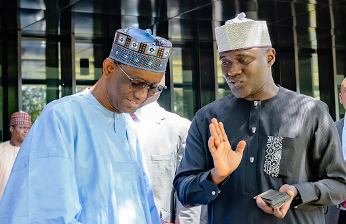The Nigerian Communications Commission (NCC) has restated its commitment to fully implement President Bola Ahmed Tinubu’s Executive Order on Critical National Information Infrastructure (CNII), which designates telecommunications facilities as critical national assets requiring optimal protection.
RELATED: Nigerian government enacts Critical National Information Infrastructure Protection Order, 2024
This follows a successful mediation led by the Office of the National Security Adviser (ONSA), in collaboration with the NCC, which resulted in the suspension of a planned strike by the Natural Oil and Gas Suppliers Association of Nigeria (NOGASA).
The strike, if executed, would have halted diesel supply to telecom sites nationwide, crippling operators’ ability to power diesel-driven generators and maintain uninterrupted network connectivity.
Strategic Mediation Prevents Service Blackout
In the days before the resolution, National Security Adviser Mallam Nuhu Ribadu engaged in high-level discussions with NOGASA’s leadership.
The NCC provided technical and regulatory insights on the potential national security, economic, and societal consequences of such a disruption.
These efforts led to an agreement to suspend the industrial action, averting what could have been a nationwide telecom blackout.
Telecom Infrastructure: A National Lifeline
“Telecommunications infrastructure is the backbone of our connectivity and digital economy,” said the NSA.
“Any disruption — whether from vandalism, construction damage, theft, denial of maintenance access, or fuel supply interruptions — has far-reaching implications for service delivery, economic stability, and national security.”
The NCC commended ONSA’s leadership in safeguarding national assets and praised stakeholders’ maturity in recognising the critical role of telecom services.
NCC’s Ongoing Protection Measures
NCC Executive Vice Chairman, Dr. Aminu Maida, reaffirmed that the Commission will enforce strict compliance with technical standards for the deployment and maintenance of telecom infrastructure.
He highlighted mediation and dialogue as vital tools in building consensus and preventing service disruptions.
The telecom regulator urged Nigerians to treat telecom facilities as shared national assets that enable communication, commerce, healthcare, education, and participation in the global digital economy.
The NCC pledged continued coordination with security agencies, industry stakeholders, and the public to ensure Nigeria’s telecom infrastructure remains secure, resilient, and reliable.
COVER PHOTO: ConsumerConnect






























